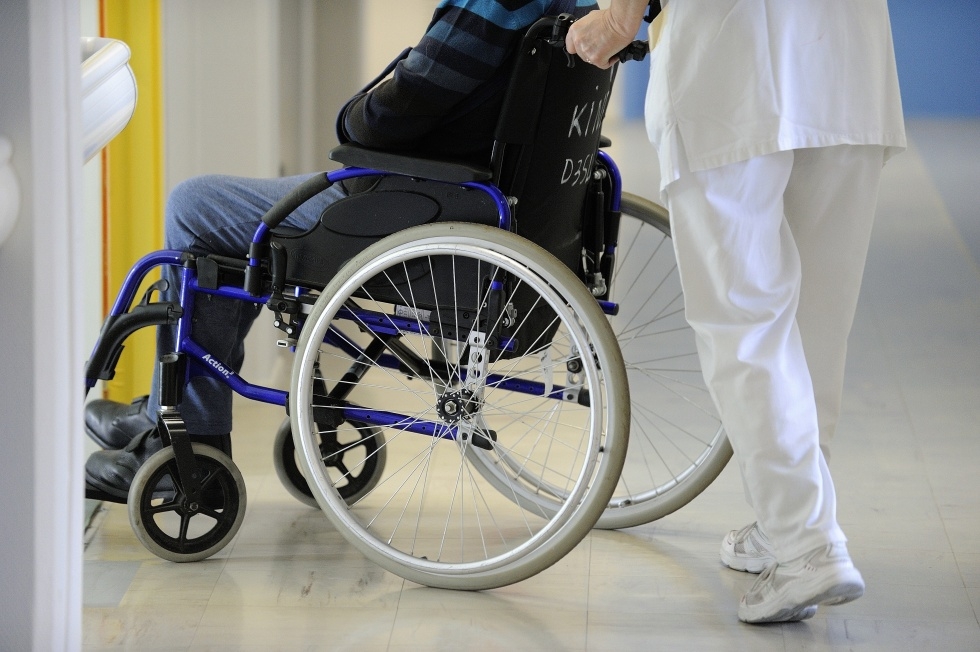Hard road ahead for Turkey's disabled

By Tuncay Kayaoglu AA
ISTANBUL - Istanbul’s newly elected local deputy Ozlem Yir is visually impaired. She shows me scars on her forehead, a result of hitting recklessly placed metal traffic signs on pedestrian roads in Turkey’s largest city. She tells me of another incident where she was ignored by a kebab vendor when she complained about the shop's dangerously placed sign in the middle of a pedestrian street.
These are two vivid examples of how as a society Turks are generally ignorant and unaware of the daily ordeals of disabled people. This ignorance is surprising given that 12 percent of Turkey’s population (approximately 8.5 million people) is disabled, according to data from a Family and Social Policies Ministry study. The study reports that most disabled people live in the Marmara region, which includes major cities like Istanbul and Bursa.
These citizens’ problems vary depending on the nature and level of their disability, but accessibility seems to be the common problem. Sixty-eight percent of disabled people have reported that our cities have serious accessibility problems, severely restricting their daily lives and increasing their dependence on others.
"Some people complain that disabled people are very reluctant to participate in daily life of the city. But, even if disabled people attempt to do such thing, cities are full of booby traps for them," Hakan Unlu, a senior official of the Istanbul-based Physical Disability Foundation, told the Anadolu Agency.
New MEE newsletter: Jerusalem Dispatch
Sign up to get the latest insights and analysis on Israel-Palestine, alongside Turkey Unpacked and other MEE newsletters
Cemal Donat, who is visually impaired and works as a lawyer for the foundation, stated that "street furnishing" such as traffic lights, trees and trash bins create difficulties for disabled people. A short walk with Donat on the streets revealed further difficulties: most traffic lights lack an audible system to warn blind people; pedestrian roads sometimes end abruptly.
Local deputy Yir says people sometimes even treat the disabled with hostility: "I notice some people are directly walking towards a blind person, knowing that two can hit face-to-face. But, they do not care."
When it comes to providing accessibility, a major burden of responsibility lies on the shoulder of municipalities and governments. Since 1997, governments have introduced different policies to help disabled people. In 2005, the Prime Minister's office published a memorandum that required all public buildings to make necessary changes for easy access of disabled people and gave officials seven years to achieve this. The Turkish parliament signed a bill in 2005 requiring all municipalities to develop and implement policies to solve disabled people's accessibly problems.
There has been progress and municipalities have implemented some policies. In the last 10 years, Istanbul Metropolitan Municipality has created a division for people with incapability and provides services for their daily needs. For access, recent additions to the bus fleet are compatible for disabled people as well. Buses and some bus stations now have audio warnings. Moreover, the Metropolitan Municipality began renovating its own buildings to improve accessibility. Muberra Kara, a coordinator at the municipality, said the body was determined to improve easy access for disabled people.
Disability advocates say that while some improvements have taken place, that much more needs to be done. For one thing, some regulations are not properly realized, with some construction companies or authorities being accused of finding loopholes in regulations which allow them to bypass disability requirements.
Moreover, there are problems with inspecting roads and buildings. A State Supervisory Council report from 2009 noted that the "gap between laws and implementation of these laws is wide". The council pointed that although a lack of personnel and finance means seem to be the main problems, the fundamental issue is that public institutions do not pay the necessary attention to implementation of laws.
A disabled member of the main opposition Republican People’s Party, Safak Pavey, said that zoning permits and inspection were two problematic areas. "While there is short-term profit, who thinks of people's long-term welfare?" Pavey complained, adding: "I would have introduced sensitivity workshops for authorities that deal with zoning permits." Donat from the Physical Disability Foundation claims that a profit-aimed approach ruins such projects.
Experts emphasize that building roads which meet the concerns of disabled are also good for others, in particular for elderly people and pregnant women. "Some believe that if they construct proper apartments and roads, that money would be wasted. But if they understand that such buildings are necessary for the community as a whole, problems could be solved permanently," Pavey says.
Most believe that education is the key to solving these problems: "Two or three generations should be taught what it is like to be a disabled person so that it can create awareness and eliminate ignorance among the society," Yir, the local deputy, pointed out.
She added that throughout her term in the local council she will press for curriculum changes at elementary schools to increase awareness to problems of disabled people at an early age.
Education is a long-term approach; what about tomorrow or the day after? Speaking to or spending time with disabled people would build empathy for these citizens' difficulties. After interviewing Yir, on the way back to office I noticed how bumpy pedestrian streets are or how recklessly advertisement signs are placed. There is a long road ahead for disabled people in Turkey.
Middle East Eye delivers independent and unrivalled coverage and analysis of the Middle East, North Africa and beyond. To learn more about republishing this content and the associated fees, please fill out this form. More about MEE can be found here.

